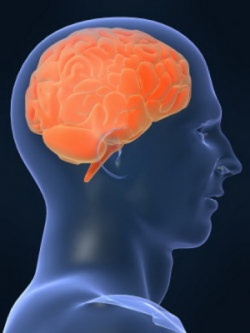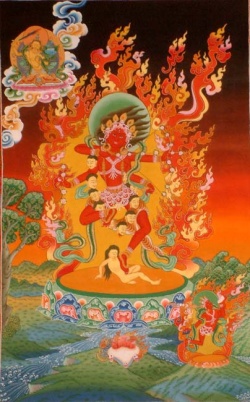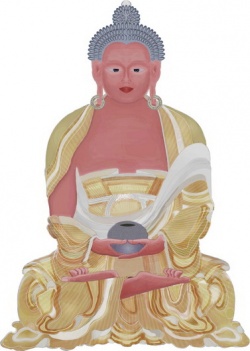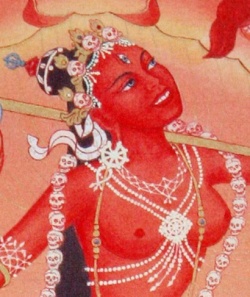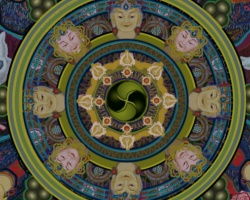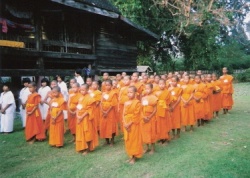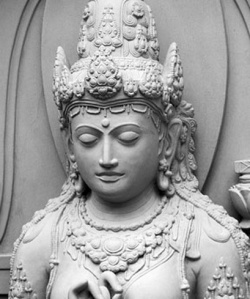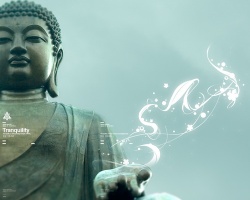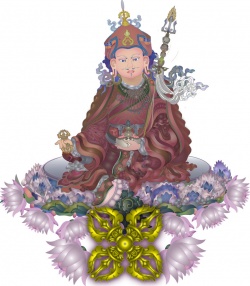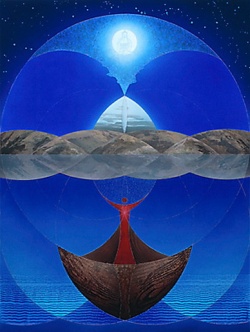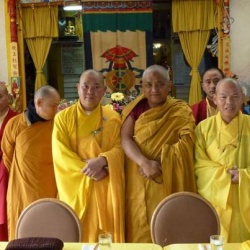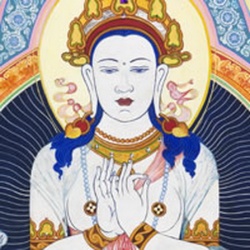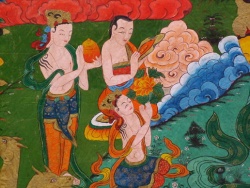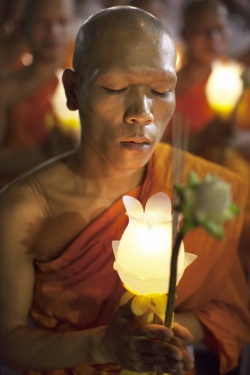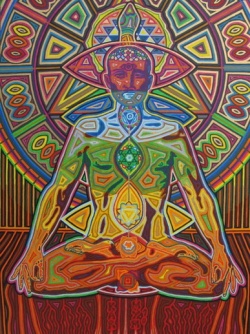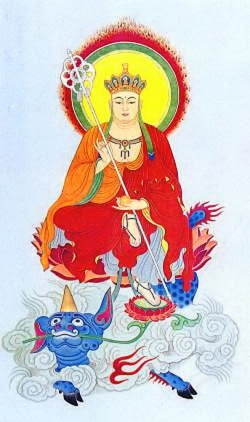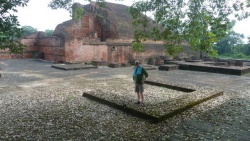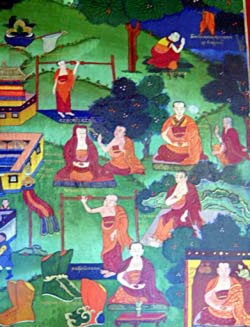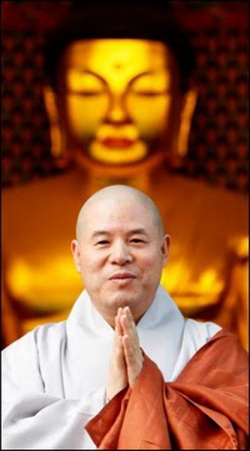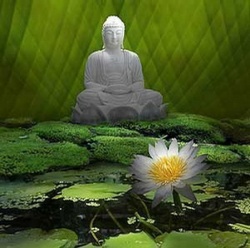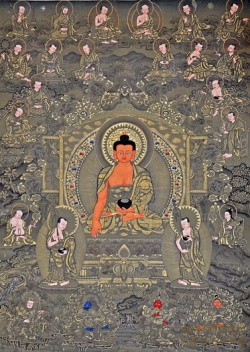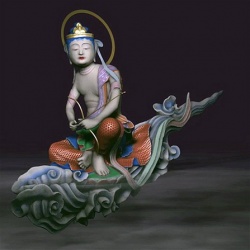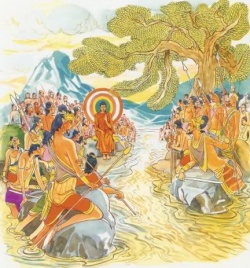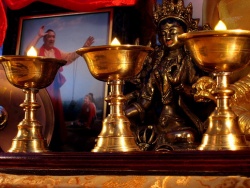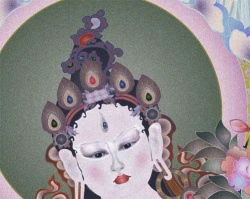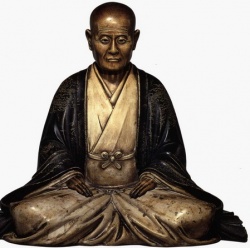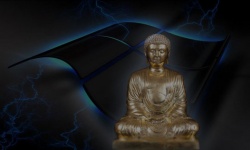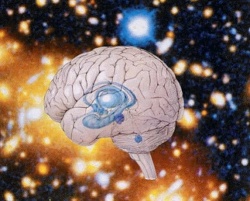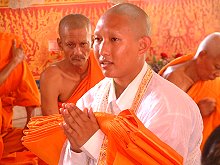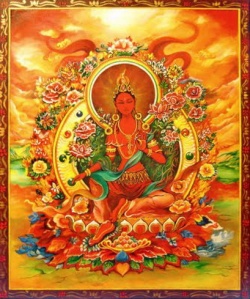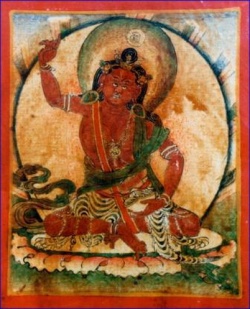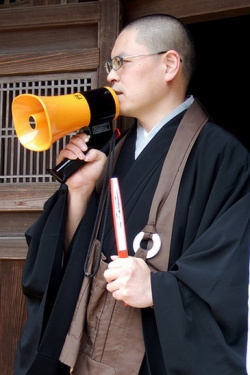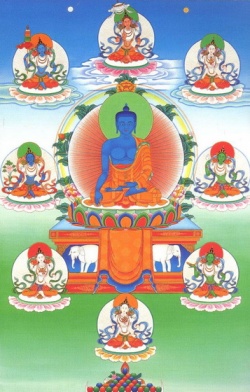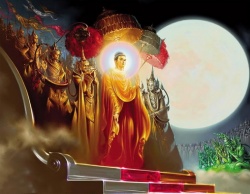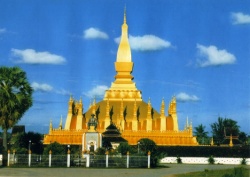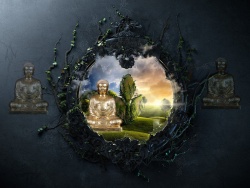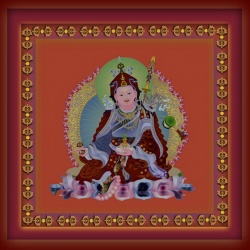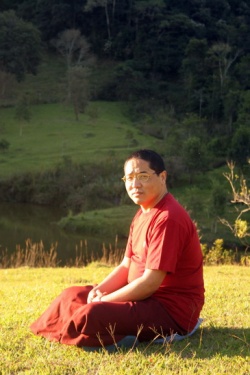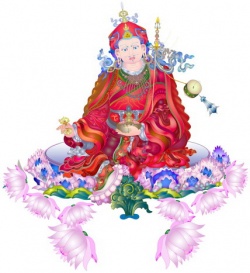Law of Cause and Effect
THE LAW OF CAUSE AND EFFECT
BY PIYADASSI THERA
INTRODUCTION
'Dependent Origination' - Pañicca-Samuppàda - is a basic teaching of the Buddha Dhamma (Buddhism). The doctrine therein being so deep and profound, it is not possible within the limited scope of this essay to make an extensive survey of the subject. Based solely on the teaching of the Buddha an attempt is made here to elucidate this doctrine, leaving aside the complex details involved.
Scholars and writers have in various forms rendered this term into English. 'Dependent Origination', 'Dependent Arising', 'Conditioned Co-production', 'Causal Genesis'. 'Conditioned Genesis' are some renderings. Throughout this essay the term 'Dependent Origination' is used. Dependent Origination is not a discourse for the unintelligent and superficial, nor is it a doctrine to be grasped by speculation and mere logic put forward by hair-splitting disputants. Hear these words of the Buddha.
'Deep, indeed, Ananda,The attendant - disciple of the Buddha. is this Pañicca-Samuppàda and deep does it appear. It is through not understanding, through not penetrating this doctrine, that these beings have become entangled like a matted ball or thread, become like munja grass and rushes, unable to pass beyond the woeful states of existence and ,sa§sàra, the cycle of existence.` Mahà Nidhàna Sutta. Digha N.
Those who fail to understand the real significance of this; all-important doctrine mistake it to be a mechanical law of causality, or, even a simple simultaneous arising, nay a first beginning of all things, animate and inanimate. Be it remembered that there is no First Cause with a capital 'F' and a capital 'C' in Buddhist thought, and Dependent Origination does not attempt to dig out or even investigate a first cause. The Buddha emphatically declared that the first beginning of existence is something inconceivable Samyutta N., II. Anamatagga Samyutta,. p. 179., and that such notions and speculations of a first beginning may lead to mental derangement Anguttara N., IV. 77.. If one posits a 'First Cause' one is justified in asking for the cause of that 'First Cause;' for nothing can escape the law of condition and cause which is patent in the world to all but those who will not see.
According to Aldous Huxley, Those who make the mistake of thinking in terms of a first cause are fated never to become men of science. But as they do not know what science is, they are not aware that they are losing anything. To refer phenomena back to a first cause has ceased to be fashionable, at any rate in the West... we shall never succeed in changing our age of iron into an age of gold until we give up our ambition to find a single cause for all our ills, and admit the existence of many causes acting simultaneously, of intricate corelations and reduplicated actions and reaction.Ends and Means (London 1945), pp. 14, 15.
A Creator - God, who rewards and punishes the good deeds and ill deeds of the creatures of his creation has no place in Buddhist thought. A theist, however, who attributes beings and events to an omnipotent Creator-God would emphatically say, 'It is God's will; it is sacrilege to question the Authority.' This god-idea stifles the human liberty to investigate, to analyse, to scrutinize, to see what is beyond this naked eye, and retards insight.
Let us grant for argument's sake that 'X' is the 'first cause' Now does this assumption of ours bring us one bit nearer to our goal, our deliverance? Does it not close the door to it? Buddhism, on the other hand, states that things are neither due to one cause (ekahetuka) nor are they causeless (a-hetuka) the twelve factors of Pañicca-Samuppàda and the twenty four conditioning relations (Paccaya) shown in the paññhàna, the seventh and the last book of the Abhidhamma piñka, clearly demonstrate how things are, 'multiple-caused' (aneka-hetuka); and in stating that things are neither causeless nor due to one single cause, Buddhism antedated modern science by twenty five centuries.
We see a reign of natural law-beginningless causes and effects-and naught else ruling the universe. Every effect becomes in turn a cause and it goes on for ever (as long as ignorance and craving are allowed to continue). A coconut, for instance, is, the principal cause or near cause of a coconut tree, and that very tree is again the cause of many a coconut tree. 'X' has two parents, four grandparents, and thus the law of cause and effect extends unbrokenly like the waves of the sea-ad infinitum.
It is just impossible to conceive of a first beginning. None can trace the ultimate origin of anything, not even of a grain of sand, let alone of human beings. It is useless and meaningless to go in search of a beginning in a beginningless past. Life is not an identity, it is a becoming. It is a flux of physiological and psychological changes.
``There is no reason to suppose that the world had a beginning at all. The idea that things must have a beginning is really due to the poverty of our imagination. Therefore, perhaps, I need not waste any more time upon the argument about the first cause.`` Bertram Russel, Why I am not a Christian, p. 4.
Instead of a "First Cause", the Buddha speaks of Conditionality. The whole world is subject to the law of cause and effect, in other words, action and result. We cannot think of anything, in this cosmos that is causeless and unconditioned.
As Viscount Samuel says: 'There is no such a thing as chance. Every event is the consequence of previous events; everything that happens is the effect of a combination of multitude of prior causes; and like causes always produce like effects. The Laws of Causality and of the Uniformity of Nature prevail everywhere and always.` Belief and Action, Penguin Books, 1939, p. 16.
Buddhism teaches that all compounded things come into being, presently exist, and cease (uppàda, ñhiti and bhaïga), dependant on conditions and causes. Compare the truth of this saying with that oft-quoted verse of Arahat Thera Assaji,An Arahat is one who has cut himself off from all fetters of existence (Sansàra) and attained to perfect purity aud peace through, comprehending the Dhamma, the Truth. one of the Buddha's first five disciples, who crystallized the entire teaching of the Buddha when answering the questions of Upatissa who later became known as Arahat Thera Sàriputta.
His question was: 'What is your teacher's doctrine? What does he proclaim?'
And this was the answer:
'Ye dhammà hetuppabhavà tesa§ hetu§ tathàgato àha
Tesa§ ca yo nirodho eva§ vàdi mahàsamaõo.P. T. S. Mahàvagga p. 40,
Whatsoever things proceed from a cause,
The Tathàgata has explained the cause thereof,
Their cessation, too, He has explained.
This is the doctrine of the Supreme SageP. T. S. Mahàvagga p. 54,
Though brief, this expresses in unequivocal Words Dependent Origination, or Conditionality.
Our books mention that during the whole of the first week, immediately after His enlightenment, the Buddha sat at the foot of the Bodhi tree at Gaya, experiencing the supreme bliss of Emancipation. When the seven days had elapsed He emerged from that Samàdhi, that state of concentrative thought, and during the first watch of the night First watch: from 6 p.m. to 10 p.m. middle watch: from 10 p.m, to 2 a.m. and the last watch: from 2 a.m. to 6 a.m. thought over the Dependent Origination in direct order thus: 'When this exists, that comes to be; with the arising of this, that arises, namely.. dependent on ignorance, volitional formations; consciousness... and so on... Thus is the arising of this whole mass of suffering.For the whole formula consisting of the 12 factors see the last pages of this essay.
Then in the middle watch of the night, He pondered over the Dependent Origination in reverse order thus; 'when this, does not exist, that does not come to be; with the cessation of this, that ceases, namely; with the utter cessation of ignorance, the cessation of volitional formations... and so on... Thus is the cessation of this whole mass of suffering.`
In the last watch of the night, He reflected over the Dependent Origination both in direct order and reverse order thus; 'When this exists, that comes to be; with the arising of this, that arises. When this does not exist, that does not come to be; with the cessation of this, that ceases, namely; dependent on ignorance. volitional formations... and soon... Thus is the arising of this whole mass of suffering. But by the utter cessation of volitional formations... and so on... Thus is the ending of this whole mass of suffering.Udàna, p, 1.
One may justifiably be inclined to pose the question; Why did not the Tathàgata set forth the doctrine of 'Dependent Origination' in His first discourse Dhammacakka-pavattana Sutta Sa§utta N., the sermon delivered to the five ascetics, His erstwhile companions, at Sarnath, Benares? The answer is this; The main points discussed in that all-important sermon are the four Noble Truths; suffering, its cause, its destruction, and the way to the destruction of suffering, the Noble Eightfold Way. There is no word in it about 'Dependent Origination'; but he who understands the philosophical and doctrinal significance of the Dependent Origination certainly understands that the twelvefold Pañicca-samuppàda, 'Dependent Origination', both in its direct order (anuloma) and reverse order (pañiloma) are included in the four Noble Truths.
The Pañicca-Samuppàda in its direct order manifests the process of becoming (bhava), in other words, the appearance of suffering (dukkha, the first Truth); and how this Process of becoming or suffering is conditioned (dukkha-samudaya, the second Truth). In its reverse order the Pañicca-Samuppàda makes plain the destruction of this becoming (dukkha-nirodha, the third Truth) and the cessation of conditions, or the destruction of suffering (dukkha nirodha gàminã pañipadà, the fourth Truth). The Buddha word with regard to this fact appears in the Anguttara Nikàya thus:
'And what, monks, is the Noble Truth of the Arising of Suffering?
'Dependent on ignorance arise volitional formations; dependent on volitional formations consciousness; dependent on consciousness, mentality-materiality (mental and physical combination); dependent on mentality-materiality the sixfold base (the five physical sense organs and consciousness as the sixth); dependent on the sixfold-base, contact; dependent on
contact, feeling; dependent on feeling, craving; dependent on craving, clinging; dependent on clinging, the process of becoming, dependent on the process of becoming, birth; dependent on birth, ageing... and death, sorrow, lamentation, pain, grief and despair come to pass. Thus does the whole mass of Suffering arise.
'This, monks, is called the Noble Truth of the Arising of Suffering.'
And what monks, is the Noble Truth of the Cessation of Suffering?
'Through the entire cessation of ignorance cease volitional formations; through the cessation of volitional formations, consciousness... and so on... the cessation of the whole mass of suffering. This monks, is called `the Cessation of Suffering`.` Anguttara N. 1. 1. 76.
It is now abundantly clear from the foregoing that the Pañicca-Samuppàda, with its twelve factors, is the teaching of the Tathàgata and not as some are inclined to think the work of some writers on the Dhamma of later times. It is unreasonable, nay dangerous, to rush into conclusions without fully understanding the significance of the Pañicca-Samuppàda. Dependent Origination, or the doctrine of conditionality, is often explained in severely practical terms, but it is not a mere pragmatical teaching, though it may appear to be so, owing to such explanations resorted to for brevity's sake. Those conversant with the Tipiñaka (the Buddhist Canon) know that in the teachings of the Pañicca Samuppàda is found that which brings out the basic principles of knowledge (¤àõa) and wisdom (pa¤¤à) in the Saddhamma, the Good Law. In this teaching of the conditionality of everything in the world, that is the five aggregates, can be realized the essence of the Buddha's outlook on life. So if the Enlightened One's explanation of the world is to be rightly understood, it has to be through a full grasp of this central teaching summed up in the dictum, 'Ye dhammà hetuppabhavà...` referred to above.
The doctrine of Pañicca Samuppàda, is not the work of some divine power; it is not a creation. Whether a Buddha arises or not the fact that 'this being, that becomes; by the arising of this, that arises., this not being, that becomes not; by the cessation of this, that ceases to be' -this conditionality goes on for ever, uninterrupted and uncontrolled by an external agency or power of any sort. The Buddha discovered this eternal truth, solved the riddle of life, unravelled the mystery of being by comprehending, in all its fullness, the Pañicca Samuppàda with its twelve factors, and expounded it, without keeping back aught is essential, to those who yet have sufficient intelligence to wish for Light.
I. IGNORANCE (Avijjà)
Let us now deal with the twelve factors of the Pañicca Samuppàda, one by one, in due order. The first point for discussion is Avijjà (Sanskrit avidyà), Ignorance. Moha and A¤¤àõa, or delusion and non-acknowledge, are synonyms. for Avijjà. What is avijjà? it is the non-knowledge of Enlightenment, Supreme Wisdom (Bodhi). In other words, not knowing the four Noble Truths. It is also not-knowing of the Pañicca Samuppàda, or conditionality, which teaches, 'This being, that becomes'. Owing to this nescience, the uninstructed entertain wrong views. They regard the impermanent as permanent, the painful as pleasant, the soulless as soul, the godless as god, the impure as pure, and the unreal as real. Further, Avijjà is the non-perception of the conglomerate nature of the five aggregates (pancakkandha), or mind and body.
Ignorance or delusion is one of the root causes of all unwholesome actions, all moral defilements (akusala). All conceivable wrong notions are the result of ignorance. Independently of this crowin corruption no ill action, whether mental, verbal or physical could be performed. That is why ignorance is enumerated as the first link of the chain of the twelvefold Pañicca Samuppàda. Nevertheless, ignorance should not be regarded as a prima causa, a first beginning, or an ultimate origin of things. It is certainly not the First Cause; there is no conception of First Cause in Buddhist thought. The doctrine of Pañicca Samuppàda can be illustrated by a circle; for it is the cycle of existence, bhava cakka in a circle any given point may be taken as the starting point. Each and every factor of the Pañicca Samuppàda can be joined together with another of the series, and therefore, no single factor can stand by itself nor function independently of the rest. All are interdependent and inseparable. Nothing is independent, or isolated. Dependent Origination is an unbroken process, in this process nothing is stable or fixed, but all in a whirl. It is the arising of ever changing conditions dependent on similar evanescent conditions. Here, there is neither absolute non-existence nor absolute existence, only bare phenomena roll on: Suddha Dhammà Pavattanti.
Ignorance, the first factor of the series, therefore, is not the sole condition for volitional formations, the second factor (sa§khàrà). A tripod, for instance, is supported by its three legs; it stands upright because of the interdependence of the legs. If one gives way, the other two fall to the ground unsupported. So, too, the factors of this Pañicca Samuppàda support one another in various ways.
II. VOLITIONAL FORMATIONS (Sa§khàrà)
Avijjà paccayà sa§khàrà (Skt. sa§skàrà), dependent on Ignorance arise rebirth-producing Volitional Formations. The term sa§khàrà has also another meaning. In the statement 'sabbe sa§khàrà aniccà' or 'aniccà vata sa§khàrà' (all compounded things are impermanent), the term ' sa§khàra' applies to-all compounded and conditioned things, i. e., all things that come into being as the effect of causes and conditions and which, themselves, act as causes and conditions in turn again to give rise to other effects. In the Pañicca Samuppàda, however sa§khàra is restricted to mean simply all good and evil actions (kusala-akusala kamma), all actions, physical, verbal and mental (kàya sa§khàra, vaci sa§khàra, and citta sa§khàra) which will bring about reactions, It is difficult to give a satisfactory English equivalent to the term sa§khàra. Let us therefore, understand it in this context as rebirth-producing volitional activities, or volitional formations or simply as kamma (Skt. karma).
Ignorance, avijjà, which has taken root in man is the blindness that prevents a man from seeing his actions as they really are, and so it allows craving to drive him on to further actions. If there were no ignorance there would not be such actions (sa§khàra). In the absence of actions conditioned by ignorance, there will be no rebirth, and the whole mass of suffering will cease. In order to exemplify how the twelve factors of the Pañicca Samuppàda act upon a connected sequence of lives, the formula has been conceived as extending over three consecutive existences, past, present and future.
Ignorance and Volitional Formations belong to the previous birth. Wholesome sa§khàras are capable of bringing about a good rebirth, i.e., birth in a good state of existence. Unwholesome sa§khàras can cause a bad rebirth or birth in an evil state of existence. It must be mentioned that all sa§khàras, all good and evil actions, have ignorance as condition. Here a question may be raised as to how actions conditioned by ignorance could bring about good rebirth.
All attainment of good (kusala), from the state of the virtuous, worlding (kalyàõaputhujjaõa) and the 'lesser streamwinner' (cålasotàpanna) to that of the consummate one (arahat) is due to the balance of knowledge over delusion and of detachmnent over craving. Good actions are the direct consequence of whatever clear understanding there may be in the doer. It is not because of delusion and craving that a man gives up killing etc., but because he has the wisdom to see the evil consequence of such actions and also because he is moved by such qualities as compassion and virtue. It is not possible except for the perfect ones to act from complete knowledge or detachment. To the generality of men such knowledge is unthinkable. As Eddington says, "If 'to know'
means to be quite certain of the term is of little use to those who wish to be undogmatic. The Philosophy of Physical Science, p.i, Cambridge University Press, 1939.And if to be detached means to be neutral always such detachment is for the imperfect quite impossible, and meaningless. But occasional detachment is possible, and a measure of knowledge adequate for understanding the good is available for an intelligent man of virtue, for producing actions that are wise and unsoiled by the yearning for rewards in this life. There is much that is done in the world today with no hope of reward, or recognition, out of compassion or for the furtherance of knowledge, peace, and so forth. Such actions definitely are based on knowledge and detachment, not perhaps in the dogmatic, scholastic, or merely metaphysical sense, but in the light of sane, undogmatic thought. Good actions may well have ulterior motives, for instance, the yearning for the fruits of the good; but even in such instances, though tainted by greed and to that extent by delusion, there are in such good actions, for instance in liberality, the detachment to let go and the knowledge of seeing the evils of not giving at all, and the advantage of giving. The presence of craving and ignorance in a person does not mean that he can never act with knowledge and detachment.
Now it must also be understood that although man is, capable of performing good actions unsoiled by strong desire for rewards in this life, there may be in him, unconsciously working, a tender longing for good rebirth, or a feeling of desire for rewards in the hereafter. Again, though he may be doing an action out of compassion and without any ulterior motives, he may still be lacking in full awareness of the real nature of life-its being impermanent, sorrow-stricken, and void of an abiding entity or soul. This non-knowledge of the real nature of life, though not so gross and strong as the delusion that induces a heinous act, can yet induce karmically wholesome action leading to a good rebirth. A good rebirth even in the heavens is, however, temporary and may be followed immediately by an unhappy rebirth.
Such non-knowledge motivates and colours the good act. If, for instance, the performance of good actions is motivated by the desire for the resultant happiness in a good rebirth in a heavenly realm, or on earth, then that is the ignorance of the impermanence and unsatisfactory nature of all existence, which becomes a condition of good rebirth - i. e. an inducement - or support condition (upanissaya paccaya). In these and other ways, ignorance may act as a condition of good rebirth by motivating or colouring good volitional activities (sa§khàra) of a mundane (lokiya) nature. Such is the intrinsic nature of ignorance.
Ignorance of the real nature of life is primarily the ignorance of the four Noble Truths. It is because of this nonknowledge of the Truths that 'beings' take birth again and again. Says the Buddha:
'Monks, it is though not understanding, not penetrating the four Noble truths that we have run so long, wandered on so long in this long long way, both you and I... But when these four Noble Truths are understood and penetrated, rooted out is the craving for existence, destroyed is that which leads to renewed becoming, and there is no more coming to be.Digha Nikàya, Mahà Parinibbàna Sutta
Only the actions of a man who has entirely eradicated all the latent tendencies (anusaya), and all the varied ramifications of sorrow's cause, are incapable of producing rebirth; for such actions are issueless. He is the Arahat, the perfect One, whose clarity of vision, whose depth of insight penetrates into the deepest recesses of life, in whom craving has quite ceased through cognizing the true nature that underlies all appearance. He has transcended all appearance. He has transcended all capacity for error through the perfect immunity which penetrative insight vipassanà, alone can give. He is, therefore, released from ignorance (avijjà) and his actions no more bring about rebirth.
III. CONSCIOUSNESS (Vi¤¤àõa)
Sa§khàra paccayà vi¤¤àõa§ (Skt. Vij¤àõa), dependept on rebirth-producing Volitional Formations belonging to the previous birth, arises Consciousness or vi¤¤àõa (re-linking or rebirth consciousness). To express it in another way, dependent on the kamma or good and evil actions of the past, is conditioned the conscious life in this present birth. Consciousness, therefore, is the first factor (nidhàna), or first of the conditioning links belonging to the present existence. avijjà and sa§khàra, ignorance and volitional formations, belonging to the past, together produce vi¤¤àõa, consciousness in this birth. We read in the Mahà Nidàna Sutta of the Digha Nikàya, how, 'once ignorance and craving are destroyed good and evil actions no more come into being, consequently no more rebirth consciousness, will spring up again in a mother's womb'. Hence it is clear that rebirth is caused by one's own good and evil actions, and it is not the work of a supreme being, a Creator God, nor is it due to mere chance.
As this consciousness or vi¤¤àõa is the first of the Stream of consciousness (citta santati) belonging to one single existence (bhava), it is also known as pañisandhi vi¤¤àõa, re-linking, consciousness. The term pañisandhi literally means re-linking, re-uniting, re-joining. It is rebirth, re-entry into the womb. Rebirth is the arising, the coming to be, the being born, in the future (pañisandhãti àyati§ uppatti). It is called re-uniting because of its linking back the new existence to the old (bhavantara pañisandhànato pañisandhãti vuccati). The joining back of the new to the old is the function of re-uniting or re-linking. Therefore, it is said, the function of re-uniting is the joining together of (one) existence with (another) existence (bhavato bhavassa pañisandhàna§ pañisandhi kicca§). Pañisandhi-vi¤¤àõa is the kamma-resultant consciousness (vipàka vi¤¤àõa.) present at rebirth, connecting the new existence with the immediately preceding one, and through that with the entire past of the being re-born. This resultant consciousness is due to previous rebirth-producing volitional formations (sa§khàra or kamma).
In the âne¤jasappàya Sutta,Majjhima N. 106. the vipàka vi¤¤àõa is referred to as 'sa§vattanika§ vi¤¤àõa§', the consciousness that links on, proceeds in one life as vipàka from the kamma in the former life.
When it is said, 'the consciousness that links on', it does not mean that this consciousness abides unchanged, continues in the same state without perishing throughout this cycle of existence. Consciousness is also conditioned, and, therefore, is not permanent. Consciousness also comes into being and passes away yielding place to new consciousness. Thus this perpetual stream of consciousness goes on until existence ceases. Existence in a way is consciousness. In the absence of consciousness no 'being exists in this sentient world'.
According to the modern science of biology 'a new human life begins in that miraculous instant when a sperm cell from the father merges with an egg cell or ovum within the mother'. This is the moment of birth. Science speaks of only these two physical common factors. Buddhism, however, speaks of a third factor which is purely psychical.
According to the Mahàtaõhàsa§khaya SuttaMajjhima N., 38. 'By the conjunction of three factors does conception take place. If mother and father come together, but it is not the mother's proper season, and the being-to-be-reborn (gandhabba) does not present itself, a germ of life is not planted. If the parents come together, and it is the mother's proper season, but the gandhabba is not present, so long there is no conception. If the mother and father come together, and it is the mother's proper season, and the gandhabba also presents itself, then a germ of life is there planted'.
This third factor, gandhabba, is simply a term for the pañisandhi-vi¤¤àõa', re-linking consciousness. There is the last moment of consciousness (cuti citta) belonging to the immediately previous life. Immediately next upon the cessation of that consciousness there arises the first moment of consciousness of the present birth, which as stated above, is termed relinking consciousness (pañisandhi-vi¤¤àõa). Between these two moments of consciousness, however, there is no interval, there is no Antaràbhava or Antaràbhavasatta which means, 'either a being in the womb or a being in between the state of death and that of rebirth', as some of the Mahàyàna schools of thought maintain. It should be clearly understood that this re-linking consciousness is not a 'self' or a 'soul' or an ego entity that experiences the fruits (vipàka) of good and evil deeds. The mahàtaõhàsa§khaya Sutta
records the following incident:-
During the time of the Buddha there was a monk called Sàti who entertained the following view: "in so far as I understand dhamma taught by the Lord, it is that this consciousness itself runs on, fares on, not another."
The monks who heard of this endeavoured to dissuade Sàti, saying, "Do not, Brother Sàti, speak thus, do not misrepresent the Lord; neither is misrepresentation of the Lord seemly, nor would the Lord speak thus. For, Brother Sàti, in many a figure is dependent origination spoken of in connection with consciousness by the Lord, saying: 'Apart from condition there is no origination of consciousness."
But Sàti would not change his view. Thereupon the monks reported the matter to the Buddha who summoning him, spoke to him thus:-
"Is it true, as is said, that a pernicious view like this has accrued to you, Sàti: 'In so far as I understand dhamma taught by the Lord, it is that this consciousness itself runs on, fares on, not another?"-"Even so do I Lord, understand dhamma taught by the Lord:" it is that this consciousness itself runs on, fares on, not another.
"What is this consciousness, Sàti?"
"It is this, Lord, that speaks, that feels, that experiences now here, now there, the fruition of deeds that are lovely and that are depraved".
"But to whom, foolish man, do you understand that dhamma was taught by me this? Foolish man, has not consciousness generated by conditions been spoken of in many a figure by me, saying: Apart from condition there is no origination of consciousness? But now you foolish man, not only misrepresent me because of your own wrong grasp, but you also injure yourself and give rise to much demerit which, foolish man, will be for your woe and sorrow 'for a long time".The quoted passages are from The Middle Length Sayings 1, p. T.S. (London, 1954), translation of Majjima Nikàya, Vol. 1. Sutta No. 38.,
In the words of the Buddha, the Pañicca-Samuppàda is a very deep and intricate doctrine, and in this difficult doctrine the most subtle and deep point, difficult to grasp, is this third link, consciousness, vi¤¤àõa or pañisandhi vi¤¤àõa; for it is this link that explains rebirth.
IV. MENTALITY-MATERIALITY (Nàma-råpa)
Vi¤¤àõa paccayà nàma-råpa§ (equal in Pàli and Skt.) dependent on consciousness arises mentality-materiality. The term nàma here stands for the mental state (cetasika), in other words, the three mental groups: namely, Feeling (vedanàkkhanda), perception (sa¤¤àkkhandha), Volitional Formations (sa§khàrakkhandha).
The so-called 'being' satta, (Skt. sattva) is composed of five aggregates or groups (pa¤cakkhandha); namely, physical body, feeling, perception, volitional formations and consciousness (råpa, vedanà, sa¤¤à, sa§khàra and vi¤¤àõa). If consciousness is taken as the mind, then feeling, perceptions and volitional formations are the concomitants or factors of that mind. Now when we say dependent on consciousness arises nàma-råpa, mentality-materiality, materiality means the physical body, its organs, faculties and functions. Mentality means the factors of the mind mentioned above. In other words, vi¤¤àõa paccayà nàma-råpa§ means, dependent on consciousness arise the three mental-concomitant factors (feeling, perception and volitional formations) that compose mentality, along with the conascent material body in its first embryonic stage.
Consciousness and its factors (citta-cetasika) are always. inter-related and inter-dependent. Consciousness cannot arise and function independently of its factors, nor can the factors, arise and function without the consciousness. They arise simultaneously (sahajàta-paccaya) and have no independent existence.
V. THE SIXFOLD BASE (Saëàyatana)
Nàma-råpa paccayà saëàyatana§ (Skt. s'adàyatana), dependent on mentality-materiality arises the sixfoldbase, the five physical sense organs, eye, ear, nose, tongue, body and the mind base (manàyatana). 'Manàyatana' is a collective term for the many different classes of consciousness, i.e. for the five kinds of sense-consciousness, and the many kinds of mind-consciousness. Hence, five bases are physical phenomena, namely eye, ear, etc; and the sixth base is identical with consciousness'.Nyànatiloeka, Fundamentals of Buddhism (Colombo. 1949) p. 67.
The function of vi¤¤àõa, consciousness, is varied. The third factor of the chain is made known to us as vi¤¤àõa now here again we hear of a sixth base, manàyatana, which, is identical with consciousness, but here by manàyatana, different types of consciousness are meant. It should be borne in mind that consciousness is not something that is permanent and everlasting; it is fleeting, and undergoes change, not remaining the same for two consecutive moments; it comes into being and immediately passes away yielding, place to new consciousness. 'These mental phenomena are, as it were, only the different aspects of those units of consciousness which like lightning every moment flash up and immediately thereafter disappear forever.'Ibid P. 65.
If there were no nàma-råpa (mentality-materiality) no saëàyatana (sixfold base) could arise. Because of råpa the physical sense organs eye, ear, etc. appear, and because of manàyatana (different types of consciousness) the physical sense organs function. Thus nàma-råpa and saëàyatana, are inescapably inter-related and inter-dependent.
VI. CONTACT (Phassa)
Saëàyatana paccayà phasso (Skt. Sparsa), dependent on the sixfold base arises contact. In the preceding proposition we saw sixfold base or àyatanas, eye, ear, etc; they are internal bases (ajjhattika-àyatana). External to one's material body there are the corresponding five sense objects, form, sound, odour, taste, and tactile object and further, the mental objects. These are known as the six external bases (bàhira-àyatana). These external bases are food for man's internal bases. Hence they are inter-related. Although, there is this functional relationship between these six sensitivities and their objects, awareness comes with vi¤¤àõa, or consciousness. Hence it is said, 'If consciousness arises because of eye and form it is termed visual consciousness.'
Now when eye and form are both present, visual consciousness arises dependent on them. Similarly with ear and sounds, and so on down to mind and mental objects (ideas). Again, when the three, namely, eye, form and eye-consciousness, come together, it is their coincidence that is called 'contact' (or impression.) From contact there arises feeling, and so on. Buddha's Teaching, transl by Lord Chalmers. Harward University Press.
Thus it is clear that contact (phassa) is conditioned by both the internal sixfold base (ajjhatthika-àyatana) and the external sixfold base (bàhira-àyatana).
In brief, dependent on the sixfold base arises contact or impressions, means: The visual contact conditioned by the eye; the sound contact conditioned by the ear; the smell contact conditioned by the nose; the taste contact conditioned by the tongue; the bodily contact conditioned by the body; the mental contact conditioned by the mind.
VII. FEELING (Vedanà)
Phassa paccayà vedanà (equal in Pàli and Skt.), dependent on Contact arises Feeling. Feeling is sixfold: feeling born of visual contact; feeling born of sound contact; feeling born of smell contact; feeling born of taste contact; feeling born of body contact and feeling born of mental contact.
Feeling may be pleasurable (sukha), painful (dukkha), or neutral, i.e. neither pleasurable nor painful (adukkhamasu'kha=upekkhà).
As stated in the preceding clause, sense objects can never be cognised by the particular sensitivity without the appropriate kind of consciousness, but when these three factors come together there arises contact. With the arising of contact simultaneously there arises feeling (vedanà) and it can never be stopped by any power or force. Such is the nature of contact and feeling. The experiencing of desirable or undesirable kamma-results of good and evil actions performed here or in a previous birth, is one of the prior conditions due to which feeling can arise.
Seeing a form, hearing a sound, smelling an odour, tasting a flavour, touching some tangible thing, cognising a mental object (idea) man experiences feeling; but it cannot be said that all beings experience the same feeling with the same object. An object, for instance, which may be felt agreeable by one, may be felt unpleasant by another, and neutral by still another. Feeling also may differ in accordance with circumstances. A sense object which once evoked unpleasant feelings in us, may possibly produce pleasant feelings in us under different circumstances, in a totally different background - geographical conditions, climatic conditions, etc. Thus we learn how feeling is conditioned by contact.
VIII. CRAVING (Taõhà)
Vedanà paccayà taõhà (Skt. tçùõà), dependent on feeling arises craving. Craving has its source, its genesis, its rise in feeling. All forms of appetite are included in taõhà. Greed, thirst, desire, lust, burning, yearning, longing, inclination, affection, household love are some of the many terms that denote taõhà which in the words of the Buddha is the Leader to Becoming (bhava netti), Becoming which manifests itself as dukkha, as suffering, frustration, painful excitement is our own experience. The enemy of the whole world is lust or craving through which all evils come to living beings. Mankind is entangled in a tangle. Through clear understanding of craving, the origin of craving, the cessation of craving, the true way of practice leading to the cessation of craving, one disentangles this tangle.
What then is craving? The Buddha's answer to this question is: 'It is that craving which leads from rebirth to rebirth accompanied by passionate delight, which rejoices now here, now there'.Sa§yutta N., L VI, 11. Dhammacakka Pavattana Sutta. Where does craving arise and take root? Where there is the delightful and the pleasurable, there craving
arises and takes root. Forms, sounds, smell, taste, bodily contacts and ideas are delightful and pleasurable, there craving arises and takes root.Digha N, 22.
Craving when obstructed by some cause is transformed to wrath and frustration. 'From craving arises grief, from craving arises fear. To one free from craving there is no grief. Whence fear?` Dhammapada, 216.
Man is always attracted by the pleasant and the delightful, and in his search for pleasure he ceaselessly runs after the six kinds of sense objects and clings to them. He little realizes that no amount of forms, sounds, smells, tastes, tangibles and mental objects will ever satisfy the eye, ear, nose, tongue, body and the mind, In this intense thirst for either possessions or the satisfaction of desires mankind gets bound, to the wheel of sa§sàra, is twisted and torn between the spokes of agony, and securely closes the door to final deliverance. The Buddha has been most emphatic against this mad rush, and in the Sutta Nipàta (v.61) warns:
`... Be sure
pleasure's a chain, brief bliss,
short rapture, long-drawn woe,
a baited hook for fools.` Dhammapada, 216.
All mundane pleasures are fleeting; like sugar-coated pills of poison they deceive us, insidiously working harm.
Whenever craving for these objects is connected with sensual pleasures it is called 'Sensuous Craving' (kàmataõhà). When it is associated with the belief in eternal personal existence; then it is called 'Craving for Existence' (bhava taõhà). This is what is known as 'sassata diññhi' or eternalism. When craving is associated with the belief in self-annihilation at death, then it is called 'Craving for Self-annihilation' (vibhavataõhà). This is what is known as 'uccheda-diññhi' or nihilism.
Craving is conditioned not only by pleasurable and agreeable feelings, but by unhappy and unpleasant feelings too.
A man in distress craves and thirsts to get rid of it, and longs for happiness and release. To express it in another way, the poor and the needy, the sick and the disabled, in brief, all sufferers, crave for happiness, security and solace. On the other hand, the rich, the healthy who have not glimpsed the sufferings of the distressed, and who are already experiencing pleasure, also crave. They crave and long for more and more pleasure. Thus craving is insatiable. As cattle go in search of fresh pasture so do men go in quest of fleeting pleasures, constantly seeking fuel for this life-flame. Their greed is inordinate.
'The whole world,' says the Buddha, is in flame, the whole world is consumed by fire. All is in flames. And what is the 'all' that is in flames? The five sense organs and the five sense objects are burning. Mind and thoughts are burning. The five aggregates of grasping (pa¤ca upàdànakkhandhà) are burning. With what are they burning? With the fire of craving, with the fire of hate, with the fire of delusion.' Craving is an insatiable fire; and no fire is ever contented, Such is the nature of this corruption that spreads right up to the highest plane of existence with respect to spheres, and right up to the 'gotrabhu citta' the threshold of sainthood, with respect to mind-flux. Where there is no self-desire, there indeed, is no sense desire either; end where there is no self-desire there all ill dies out like a flame whose fuel is spent.
It is only when suffering comes, as its consequence, and not before, that one realizes the viciousness of this poisonous creeper of craving which winds itself round all who are not Arahats or perfectly pure ones who have uprooted its tap-root, ignorance. The more we crave, the more we suffer; sorrow is the tribute we have to pay for having craved. Wherefore, know this craving as our foe here, in sa§sàra, that guides us to continued and repeated sentient existence, and so builds the 'House of Being'.
The Master on attaining full Enlightenment formed the following thought:
'Through many a birth wandered, I in sa§sàra, seeking for the builder of the house, and finding him not; painful is birth again and again'.
'O builder of the house, thou art seen, thou shall not build a house again. Broken are all thy rafters, shattered is thy ridge-pole. My mind has attained the Unconditioned (Nibbàna), attained is the extinction of craving.` Dhammapada, v. 153, 154.
IX. CLINGING (Upàdàna)
'Taõhà Paccayà upàdàna§' (equal in Pàli and Skt.) dependent on Craving arises Clinging. This is the mental state that clings to, or grasps the object even as a piece of raw meat that sticks to a sauce-pan. Because of this clinging which is described as craving in a high degree. man becomes a slave to passion, and falls into the net he himself has made of his passion for pleasure, like the caterpillar that spins itself a tangle in which it lives'.
Clinging or Attachment (upàdàna) is four-fold:
Attachment to sensuous pleasures or sense desires (kàma-upàdàna);
attachment to wrong and evil views (diññhi-upàdàna);
attachment to mere external observances-rites, and rituals; (sãlabbata upàdàna) and
attachment to self, or a lasting soul-entity (attavàda upàdàna).
In brief, by upàdàna, clinging to sensuous desires interpreted to include all kinds of existence, and clinging to views (kàma upàdàna and diññhi upàdàna) are meant; the third and fourth (sãlabbata and attavàda) being included in the, diññhi upàdàna, wrong views.
Kàma here means both the craving and the craved object (kilesa kàma and vatthukàma) and when that craving for such desired objects become intensified, it is known as `kàma upàdàna` or clinging. Man entertains thoughts of craving, and in proportion as he fails to ignore them, they grow till they get intensified to the degree of tenacious clinging.
All the various wrong views (diññhi) that were in existence during the time of the Buddha could be included in Nihilism (uccheda diññhi) and Eternalism (sassata diññhi). To some, especially to the intellectuals, at times, the giving up of a view that they have cherished, is more difficult than giving up objects of sense. Of all wrong views the clinging to a belief in a soul or self or an abiding ego-entity (attavàda upàdàna) is the strongest, foremost and most pernicious.
It is not without good reason that the Buddha rejected the notion of a self or soul (attà). In this conflux of mind and body which undergoes change without remaining the same for two consecutive moments, the Buddha sees not a lasting indestructible soul. In other words, He could locate no abiding soul in this ever changing 'creature'. The Enlightened One, therefore, emphatically denied an (attà) either in the five aggregates (material, form, feeling, perception, volitional formations, consciousness) or elsewhere. 'All- this,` He said, 'is void of an attà or anything of the nature of an attà (su¤¤a§ ida§ attena và attaniyena và)Majjhima N., 22. If this wrong notion is got rid of, all the existing wrong and pernicious views automatically cease.
X. BECOMING (Bhava)
'Upàdàna paccayà bhavo' (equal in Pàli and Skt.) dependent on Clinging arises Becoming. Becoming is twofold, and should be understood as two processes: Kamma-Process (kamma-bhava) and Kamma-resultant Rebirth Process (upapatti bhava) Kamma bhava is the accumulated good and evil actions, the 'kammically active side of life.' Upapatti bhava is 'the kammically passive and morally neutral side of life', and signifies the kamma-resultant Rebirth-process in the next life. The next life may be any sphere or plane of sentient existence (kàma bhava), that of form (råpa bhava), and that of formless existence (aråpabhava).
In the first clause (avijjà paccayà sa§khàrà), sa§khàrà is explained as good and evil actions (kamma); if that is so, is it not repetitive to say that 'kammabhava,' mentioned here, also means good and evil actions? The Pañicca Samuppàda, we must know, is concerned not only with the present life but with all the three lives-past, present and future. Kamma or the good and evil actions mentioned in the first clause, belong to the past-and on those past actions the present life depends. The kamma that is referred to here in this clause, upàdàna paccayà bhavo,' belongs to the present life and that in turn causes future life. Upàdàna paccayà bhavo means; clinging (upàdàna) is the condition of the Karma-process, or actions (kamma-bhava).
XI. BIRTH (Jàti)
'Bhava paccayà jàti' (equal in Pàli and Skt.), dependent on Becoming arises Birth. Here birth means not the actual childbirth; but appearance of the five aggregates (material form, feeling, perception, formations, and consciousness) in the mother's womb. This process is conditioned by kammabbava.
The present birth is brought about by the craving and clinging Kamma-volitions (taõhà and upàdàna) of the past births, and the craving and clinging Kamma-volitions of the present birth bring about future rebirth. According to the teaching of the Buddha, it is this kamma-volition that divides beings into high and low.Majjhima N., 135.
'Beings are heirs of their own deeds; bearers of their deeds, and their deeds are the womb out of which they spring, and through their deeds alone they must change for the better, remake themselves, and win liberation from ill.
We are reaping what we have sown in the past; some of our reapings, we know, we have even sown in this life. In the selfsame way, our actions here mould the hereafter, and thus we begin to understand our position in this mysterious universe. If we, through our ignorance, craving and clinging in the long night of sa§sàric wandering, have not shaped ourselves as we are, how could there be such difference and dissimilarity between living beings as we see in the world today? Can we conceive of a mind; a single mind vast ,and confused enough to plan out such a motley sentient world as surrounds us?
Thus kamma is the corollary of rebirth, and rebirth on the other hand is the corollary of kamma. Here it may be asked: If kamma is the cause of rebirth and if Buddhism emphatically denies a soul or a trancendental ego how does this kammic process bring about rebirth?
Well, 'No force is ever lost, and there is no reason to think that the force manifest in each being as mind and body is ever lost. It ever undergoes transformations. It is changing now, every moment of our lives. Nor is it lost at death. The vitalizing mind flux is merely reset. It resets in conditions harmonizing with itself, even as broadcast sounds reset in a receiver tuned to the particular wave length. It is the resetting of this vital flux, in fresh conditions, that is called rebirth. Each reborn being starts with an unique set of latent possibilities, the accumulated experiences of the past. That is why character differs, why each endows himself with what, theists call 'gifts and infinite possibilities.` 'What I Believe', an article contributed to the Ceylon Observer October, 1937, by Dr. Cassius A. Pereira, late Cassapa Thera.
There is nothing that passes or transmigrates from one life to another. Is it not possible to light one lamp from, another and in this process does any flame pass from one to other? Do You not see the continuity of the flame? It is, neither the same flame nor totally a different one.
Kammic process (kammabhava), therefore, is 'the force, in virtue of which reaction follows actions'; it is the energy that out of a present life, conditions a future life in unending sequence.
'Desire gives rise to deed; deed gives rise to result; result exhibits itself as new corporeality endowed with new desire. Deed is as inevitably followed by result as the body by its shadow. This is merely the universal natural law of conservation of energy extended to the moral domain. As in the universe no energy can ever be lost, so also in the individual nothing can be lost of the resilient force accumulated by desire. This resilient energy is always transmuted into fresh life and we live eternally through our lust to live. The medium, however, that makes all existence possible is Kamma'.PauI Dahlke. Buddhist Essays (London, 1908), p. 115.
XII. AGEING AND DEATH (Jarà-maraõa)
Jàti paccayà jaràmaraõa§, dependent on Birth arises Ageing and Death; and with them naturally come sorrow, lamentation, pain, grief and despair. Birth is inevitably followed by ageing and death; in the absence of birth there will be no ageing and death. Thus this whole mass of suffering arises dependent on the twelvefold Dependent Origination, (Pañicca Samuppàda). Ageing and death are followed by birth and birth on the other hand, is followed by ageing and death and the pair thus accompany each. other in bewildering succession. Nothing mundane is still; it is all in a whirl. Man builds up wishful hopes and plans for the morrow, but one day, sudden perhaps, and unexpected, there comes the inevitable hour when death puts an end to this brief span of life, and brings our hopes to naught. So long as man is attached to existence through his ignorance, craving and clinging, to him death is not the final end. He will continue his career of whirling along with the wheel of existence, and will be twisted and torn between the spokes of agony. Thus, looking around us in the world at the different types of men and women about us, and at the differences in their varying fortunes, we know that these cannot be due to any mere chance.
An external power or agency that punishes the ill deeds and rewards the good deeds of beings has no place in Buddhist thought. Buddhists do not resort to any especially graced person or pray to any imperceptible individual to grant them Deliverance. Not even the supreme Buddha could redeem them from sa§sàra's bond. In ourselves lies the power to mould our lives. Buddhists are Kammavàdins, believers in efficacy of actions good and evil.
According to the teachings of the Buddha the direct cause of the distinctions and inequailities of birth in this life, is the (atãtakamma) or good and evil actions of each Individual in past lives. In other words each man is reaping what he sowed in the past. In the selfsame way his actions here mould his hereafter.
In all actions, good or evil, mind is the most important factor. 'All mental states have mind as their forerunner; mind is chief, everything is mind-made. 1f one speaks or acts with a polluted mind, pain follows him in consequence as the cart wheel the foot of the beast of burden.' In like manner, in consequence of mentations made, words spoken and deeds, done with a pure and placid mind, happiness follows him even as the inseparable shadow.Dhammapada, verse 1.
Man is always changing either for good or for evil. This changing is unavoidable and depends entirely on his own, actions and on nothing else.
The world seems to be imperfect and ill-balanced. We are too often confronted with many a difficulty and shortcoming. Men differ from one another in many ways, and aspects. Amongst us human beings, let alone the animal kingdom, we see some born as miserable wretches, sunk in deep distress and supremely unhappy; others born into a state of abundance and happiness enjoying a life of luxury and knowing nothing of the world's woe. Again a chosen few are gifted with keen intellect and great menial capacity, while many are wrapt in ignorance. How is it that some of us are blessed with health, beauty, sincere friends and amiable relatives while others are despicable weaklings, destitute and lonely? How is it that some are born to enjoy long life while others pass away in the full bloom of youth? Why are some blessed with affluence, fame and recognition? Why are some chosen few given in full measure all the things which human beings deserve while others are utterly neglected? These are intricate problems that demand a solution.
If we, but pause for a moment and impartially investigate and intelligently inquire into things, we will find that these wide differences are not the work of an external agency or a superhuman being. We will find that we ourselves are responsible for our deeds whether good or ill and that we ourselves are the makers of our own Kamma.
Says the Buddha
`According to the seed that is sown
So is the fruit ye reap therefrom.
Doer of good will gather good,
Doer of evil, evil reaps.
Sown is the seed and thou shalt taste
The fruit thereof.'
It is just impossible to conceive of an external agency or some all-powerful being who distributes his gifts to different. persons in diverse measures, and who at times showers all, his gifts on the same individual. Is it not more rational to, say that:
'Whatever a man does, the same he in himself will find; The good man good; and evil that evil has designed: And so our deeds are all like seeds and bring forth, fruit in kind.'
'Who toiled a slave may come anew a Prince
For gentle worthiness and merit won,
Who ruled a King may wander earth in rags
For beings done and undone,'
Buddhists do not blame the Buddha or a superhuman being or a deva or an especially graced person for the ills, of mankind or praise them for the happiness men experience.
It is knowledge of kamma and (kamma-vipàka), the law of cause and effect, or moral causation, that urges a true Buddhist to refrain from evil aid do good. He who understands cause and effect knows well that it is his own actions and nothing else that make his life miserable or otherwise. He knows that the direct cause of the distinctions and inequalities of birth in this life, is the good and evil actions of each individual in past lives and in this life.
'Man today is the result of millions of repetitions of thought and action. He is not ready-made; he becomes, and is still becoming. His character is predetermined by his own choice. The thought, the act which he chooses, that by habit he becomes.'
It should, however, be stated that according to Buddhism not everything that occurs is due to past actions. During the time of the Buddha, sectarians like the Niganñhas, Makkhali Gosàla and others, held the view that whatsoever the individual experiences, be they pleasant or unpleasant or neither, all come from former actions or past kamma.Digha N., 2. The Buddha. however rejected this theory of an exclusive determination by the past (pubbekatahetu) as unreasonable. Hence it is not true to say that all things that occur are due to past kamma or actions.
Is it not absurd for a student who fails in his examinations due to sheer laxity on his part, to attribute the failure to his past kamma? Is it not equally ridiculous for a person to rush about carelessly, bang himself against a stone or some similar thing, and ascribe the mishap to his past actions or kamma? One can multiply such instances to show that not everything is due to actions performed in the past.
But when the causes and conditions of things are destroyed, automatically the effects also cease to be. Sorrow will disappear if the varied rootlets of sorrow's, cause are eliminated. A man, for instance, who burns to ashes a mango seed, puts an end to its germinating power and that seed will never produce a mango plant. It is the same with all compounded things (sa§khàra), animate or inanimate. As kamma is our own manufacture we have the power to break this endless chain, this wheel of existence (bhava cakka). Referring to those enlightened ones who have conquered themselves through the uprooting of the defilements, the Buddha says in the Ratana Sutta:
'Their past is extinct, a fresh becoming there is not, their minds are not attached to a future birth, their desires grow not-those wise ones go out even as this lamp.` Sutta Nipàta, Ratana Sutta, verse 14.
The (Pañicca Samuppàda), with its twelve links starting with ignorance and ending in ageing and death, shows how man being fettered, wanders in (sa§sàra) birth after birth. But by getting rid of these twelve factors man can liberate himself from suffering and rebirth. The Buddha has taught us the way to put an end to this repeated wandering. It is by endeavouring to halt this Wheel of Existence that we may find the way out of this tangle. The Buddha word which, speaks of this cessation of suffering is stated thus:
`Through the entire cessation of ignorance cease volitional formations;
Through the cessation of volitional formations, consciousness;
Through the cessation of consciousness, mentality-materiality;
Through the cessation of mentality-materiality, the sixfold base;
Through the cessation of sixfold base, contact;
Through the cessation of contact, feeling;
Through the cessation of feeling, craving;
Through the cessation of craving, clinging;
Through the cessation of clinging, becoming;
Through the cessation of becoming, birth;
Through the cessation of birth, cease ageing and death, sorrow, lamentation, pain, grief and despair.
Thus does this whole mass of suffering cease.` Anguttara N., I, 176.
Though in Buddhism time is considered as a mere concept (pa¤¤atti), in the language of the apparent truth (sammuti sacca) we speak of three periods of time; and the (Pañicca Samuppàda) formula can be taken as representing three periods of time, namely, the past, the present and the future. The two factors Ignorance and Volitional Formations (avijjà and sa§khàra) belong to the past; the next eight, beginning with consciousness (vi¤¤àõa) belong to the present; and the last pair, birth, ageing and death, belong to the future.
In this Wheel of Existence there are then three connecting links (sandhi). Between Volitional Formations (sa§khàra), the last factor of the past, and Consciousness (vi¤¤àõa), the first factor of the present, there is one link consisting of past cause and present fruit (hetu-phala). Consciousness, Mentality-materiality, the Sixfold Base, Contact, and Feeling are effects in the present life caused by Ignorance and Volitional Formations of the past. Because of these five factors there come into being three other factors, namely, Craving, Clinging and Becoming which will cause birth in the future. Therefore, between Feeling and Craving there is another link consisting of present fruit and present cause (phala-hetu.) Because of Craving, Clinging, and Becoming of the present there come into being Birth, Ageing and Death in the future. Therefore, between Becoming and Birth there is another link. These three links consist of four sections:
Ignorance, Volitional Formations;
Consciousness, Mentality-materiality, Sixfold Base, Contact, Feeling;
Craving, Clinging, Becoming;
Birth, Ageing and Death (see diagram).
'Five causes in the past
And now a fivefold fruit,
Five causes now
And yet to come a fivefold fruit.` Visuddhi Magga, vol. II. p. 579.
The text mentions 'Ignorance' and 'Volitional Formations' as past causes. ``But one who is ignorant hankers, and hankering, clings, and with his clinging as condition there is, becoming, therefore (Craving, Clinging and Becoming) are included as well. Hence it is said: 'In the previous kamma-process becoming, there is delusion, which is 'ignorance;' there is accumulation, which is formation; there is attachment, which is 'craving;' there is embracing, which is 'clinging;' there is volition, which is 'becoming;' thus these five things in the previous kamma-process becoming are conditions for rebirth-linking here (in the present becoming).`` Bhikkhu ¥ànamolil, The Path of Purification p. 669, Colombo, 1956, translation of Visuddhi Magga.
Now the fivefold fruit in the present life as given in the text, is represented by five factors; Consciousness, Mentality-materiality, the Sixfold Base, Contact, Feeling.
There are five causes we now produce, of which the text gives only Craving, Clinging and Becoming. ``But when Becoming is included, the Formations that precede it or that are associated with it are included too. And by including Craving and Clinging, the Ignorance associated with them, deluded by which a man performs kamma, is included too. So they are five.`` IB. p. 671.
Fivefold fruit we reap in the future. This is represented by Consciousness, Mentality-materiality, Sixfold Base Contact, Feeling. The text gives also birth and ageing and death as the future fivefold fruit. Birth really is represented by these five beginning with Consciousness and ending in Feeling. Ageing and death is the ageing and death of these five.
On close analysis, it becomes clear that in this Dependent Origination, (Pañicca Samuppàda), in this repeated process of rebirth, in this Cycle of Existence there is nothing Permanent, nothing of the kind of an enduring soul-entity that passes from one birth to the next. All (dhammas) are causally dependent, they are conditioned (sabbe dhammà pañicca samuppannà), and this process of events is utterly free from the notion of a (jãvàtma) or a (paramàtma), microcosmic soul, microcosmic soul or cosmic soul. It was the recognition that this (àtma) was an illusion, a mirage, that made the Buddha's doctrine so singular and so revolutionary.
The Buddha declares: To believe the doer of the deed will be the same as the one who experiences its results (in the next life): this is the one extreme. To believe that doer of the deed, and the one who experiences its results, are two different persons: this is the other extreme. Both these extremes the Perfect One has avoided and taught the truth that lies in the middle of both, to wit: Through ignorance conditioned are the Kamma formations and so on (see formula). Thus arises this whole mass of suffering.``
Hence the ancients said:
'There is no doer of a deed
Or one who reaps the deed's result;
Phenomena alone flow on-
No other view than this is right.`
'For here there is no Brahmi God,
Creator of the round of births'
Phenomena alone flow on-
Cause and component their condition.` Bhikku ¥ànamoli, The Path of Purification p. 700, translation of Visuddhi Magga.
In concluding this essay on Dependent Origination, a Confusion that may arise in the reader's mind should he forestalled. If according to Dependent Origination things are determined by conditions, one may be inclined to think that the Buddha encouraged fatalism or determinism, and that human freedom and free will' are put aside.
But what is fatalism? According to the Dictionary of Philosophy, 'Fatalism is determinism, especially in its theological form which asserts that all human activities are predetermined by God.' Determinism according to the Oxford English Dictionary, is the philosophical doctrine that human action is not free but necessarily determined by motives, which are regarded as external forces acting upon the will.' The doctrine of kamma refutes that. A clear understanding of Buddhism shows that the Buddha never subscribed to the theory that all things are unalterably fixed; that all things happen by inevitable necessity. Everywhere we see certain laws and conditions functioning, and one of these is (cetanà) or volition, which is (kamma). There is no law giver, no external agency to interfere with the mental and material happenings. Through causes and conditions things come to be. With the cessation of conditions and causes things come to end.
Thus is this endless play of action and reaction kept in perpetual motion by (kamma) concealed by ignorance and propelled by craving. In no way does this affect the freedom of the will and the responsibility of man for his acts (his kamma).
Lastly a word about 'free will': will is not something static. It is not a positive entity, or a self-existent thing. Will is quite momentary like any other mental state; there is, therefore, no 'will' as a 'thing' to be either free or not free. The truth is that 'will' is conditioned and a passing phenomenon.
To the genuine Buddhist the primary concern of life is not mere speculation, or vain voyages into the imaginary regions of high fantasy, but the gaining of true happiness and freedom from all ill. (Pañicca Samuppàda) which speaks of ill and the cessation of ill, is the central conception of Buddhism, and represents the finest flower of Indian thought.
PAòICCA - SAMUPPâDA (Anuloma)
`DEPENDENT ORIGINATION' (In direct order)
i-ii
Avijjà-paccayà Sa§khàrà
ii-iii
Sa§khàra-paccayà Vi¤¤àõa§
iii-iv
Vi¤¤àõa-paccayà Nàma-råpa§
iv-v
Nàma-råpa-paccayà Saëàyatana§
v-vi
Saëàyatana-paccayà Phasso
vi-vii
Phassa-paccayà Vedanà
vii-viii
Vedanà-paccayà Taõhà
viii-ix
Taõhà-paccayà Upàdàna§
ix-x
Upàdàna-paccayà Bhavo
x-xi
Bhava-paccayà Jàti
xi-xii
Jàti-paccayà Jarà-maraõa§ soka-parideva-dukkha-domanassåpàyàsà sambhavanti. Eva metassa kevalassa dukkhak-kbandbassa samudayo hoti.
PAòICCA - SAMUPPâDA (Pañiloma)
`DEPENDENT ORIGINATION' (In reverse order)
i-ii
Avijjà-yatveva asesa-viràga-nirodhà sa§khàra-nirodho
ii-iii
Sa§khàra-nirodhà Vi¤¤àõa-nirodho
iii-iv
Vi¤¤àõa-nirodhà Nàma-råpa-nirodho
iv-v
Nàma-råpa-nirodhà Saëàyatana-nirodho
v-vi
Saëàyatana-nirodhà Phassa-nirodho
vi-vii
Phassa-nirodhà Vedanà-nirodho
vii-viii
Vedanà-nirodhà Taõhà-nirodho
viii-ix
Taõhà-nirodhà Upàdàna-nirodho
ix-x
Upàdàna-nirodhà Bhava-nirodho
x-xi
Bhava-nirodhà Jàti-nirodho
xi-xii
Jàti-nirodhà Jarà-maraõa§ soka-parideva-dukkha-domanassåpàyàsà nirujjhanti. Eva metassa kevalassa dukkhak-khandhassa nirodho hoti.
(Sa§yutta-Nikàya, II, 1)
TRANSLATION
(In Direct Order)
The Arising of the Wheel of Existence
i-ii
Dependent on Ignorance (avijjà) arise Volitional Formations (sa§khàra)
ii-iii
Dependent on Volitional Formations (sa§khàra) arises re-linking or rebirth Consciousness (vi¤¤àõa)
iii-iv
Dependent on Consciousness (vi¤¤àõa) arise Mentality-materiality (nàma-råpa)
iv-v
Dependent on Mentality-materiality (nàma-råpa) arises the Sixfold Base (saëàyatana)
v-vi
Dependent on the Sixfold Base (saëàyatana) arises Contact (phassa)
vi-vii
Dependent on Contact (phassa) arises Feeling (vedanà)
vii-viii
Dependent on Feeling (vedanà) arises Craving (taõhà)
viii-ix
Dependent on Craving (taõhà) arises Clinging (upàdàna)
ix-x
Dependent on Clinging (upàdàna) arises Becoming (bhava)
x-xi
Dependent on Becoming (bhava) arises Birth (jàti)
xi-xii
Dependent on Birth (jàti) arises ageing and death (jarà-maraõa), and sorrow, lamentation, pain, grief and despair. Thus there is the arising of this whole mass of suffering.
(In Reverse Order)
The Cessation of the Wheel of Existence
i-ii
Through the entire cessation of this Ignorance, Volitional Formations cease
ii-iii
Through the cessation of Volitional Formations, Rebirth Consciousness ceases
iii-iv
Through the cessation of Rebirth Consciousness, Mentality-materiality ceases
iv-v
Through the cessation of Mentality-materiality, the Sixfold Base ceases
v-vi
Through the cessation of Sixfold Base, Contact ceases
vi-vii
Through the cessation of Contact, Feeling ceases
vii-viii
Through the cessation of Feeling, Craving ceases
viii-ix
Through the cessation of Craving, Clinging ceases
ix-x
Through the cessation of Clinging, Becoming ceases
x-xi
Through the cessation of Becoming, Birth ceases
xi-xii
Through the cessation, of Birth, Ageing and Death cease, and sorrow, lamentation, pain, grief and despair. Thus there is the cessation of this whole mass of suffering
Printed at Diamond Printers. Published by
W. P. Chandraratne J.P.
Matter Composed at Sasana Sevaka Society.
